#pekařův císař
Explore tagged Tumblr posts
Text
#czech#čumblr#anketa#hezky česky#poll#hlasování#svátky#pohádky#filmy#anděl páně#byl jednou jeden král#sůl nad zlato#tři oříšky pro popelku#three wishes for cinderella#pyšná princezna#princezna se zlatou hvězdou na čele#jak se budí princezny#s čerty nejsou žerty#pekařův císař#císařův pekař#láska rohatá
66 notes
·
View notes
Text

24 notes
·
View notes
Text
Kateřina/Sirael z Císařův pekař – Pekařův císař má autistický swag.
14 notes
·
View notes
Text
Ani jeden z týchto som ešte nevidel a chcem to napraviť. Problémom je že ja pri filmoch nevydržím dávať pozor tak sa snažím si to trochu oživiť...
24 notes
·
View notes
Text
Předtím než postnu bracket
Vzdejme holt těm pohádkám, které mezi námi nejsou (měli jen jeden hlas a nedostali se do turnaje):
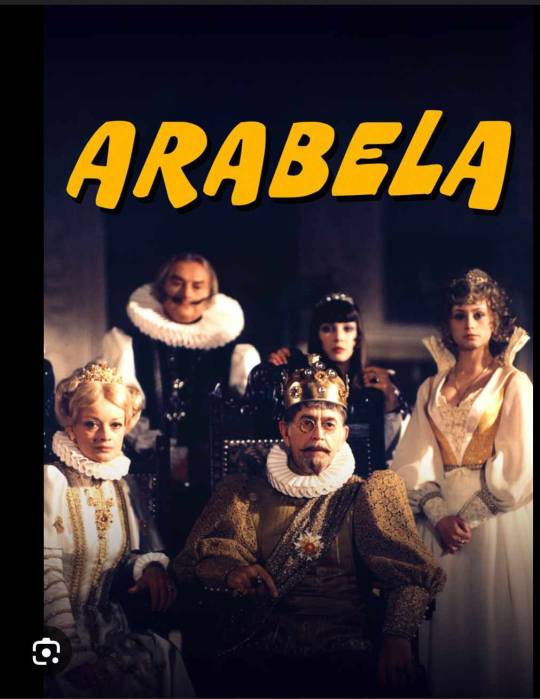
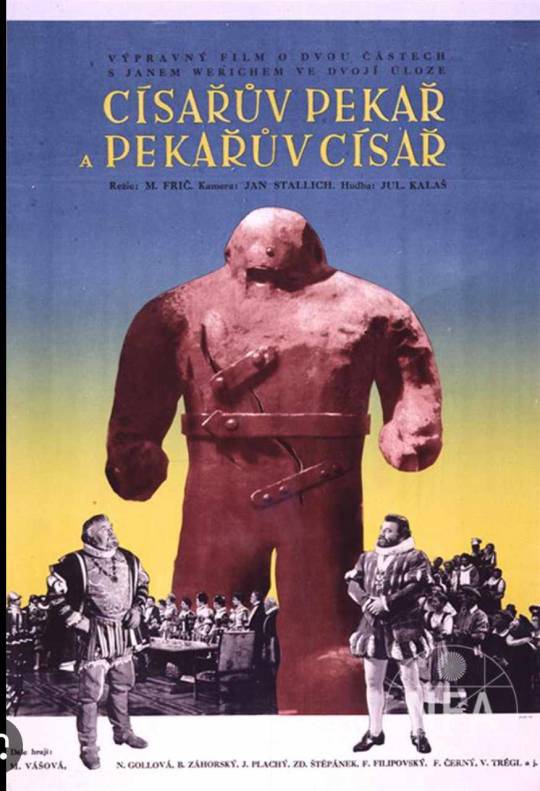

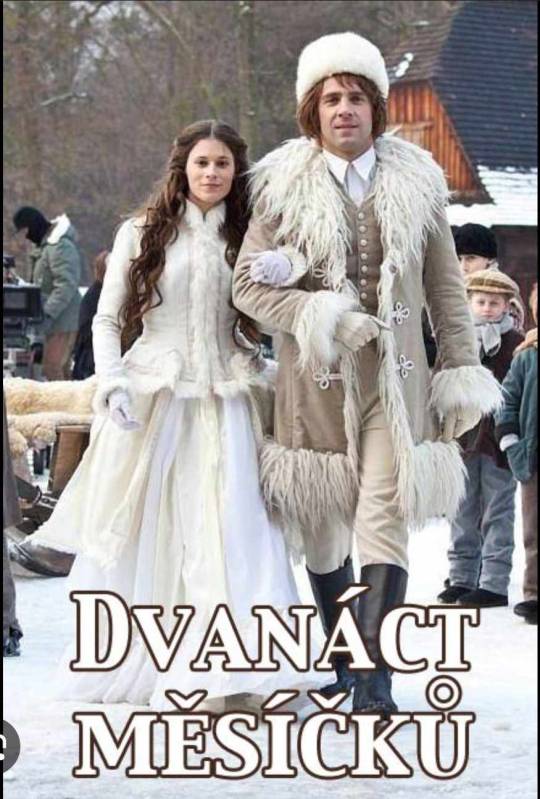

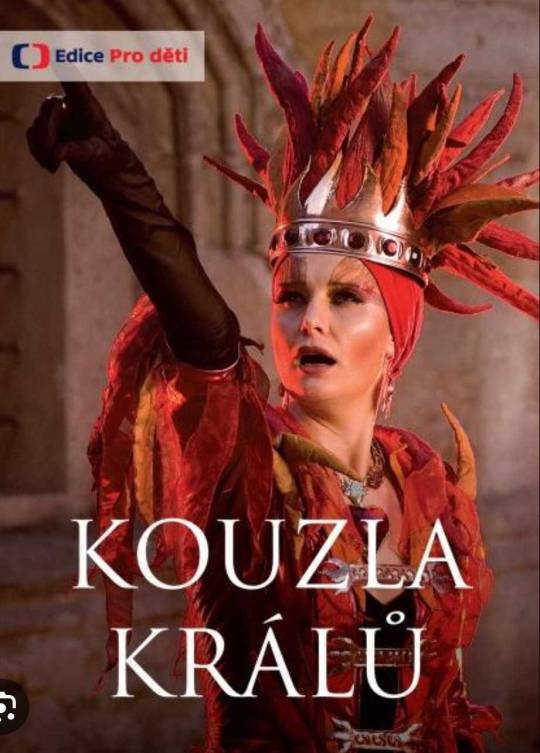

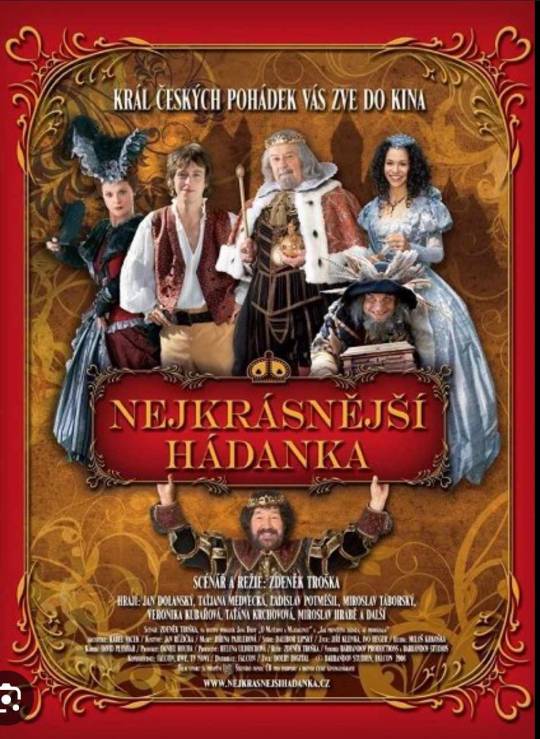
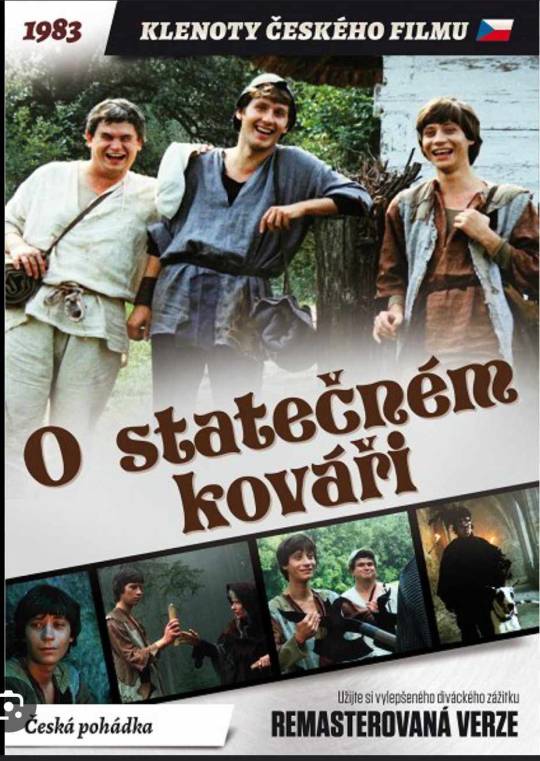


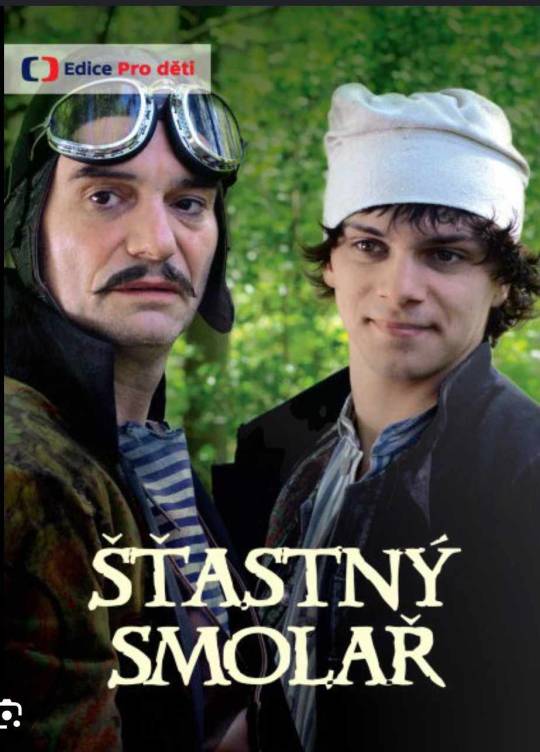

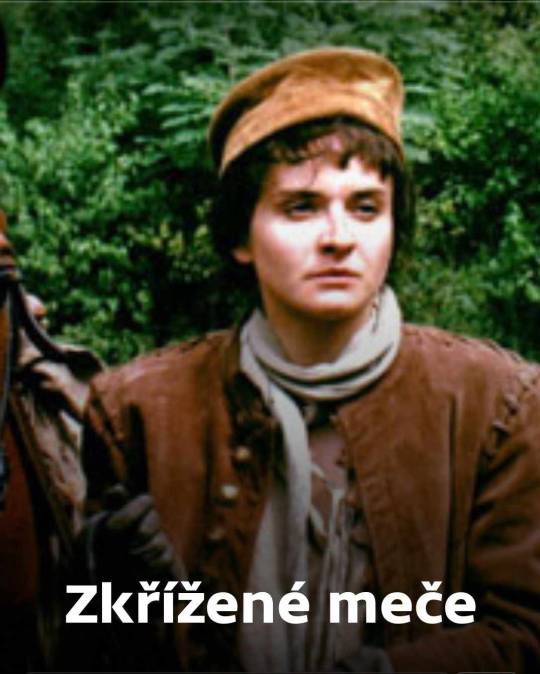

a jejich propaganda:
Císařův pekař a Pekařův císař
[vložte celý text Ten d��lá to a ten zas tohle]
Honza málem králem
- Honzovy modré punčochy mají neskutečný swag - svítí, svítí slunce nad hlavou, nad hlavou 🎶🎶🎶
Kouzla králů
Best soundtrack ever!
Král Drozdí brada (1984)
Nádherné kostýmy, krásní herci a mladý Lukáš Vaculík
Nejkrásnější hádanka
Pohádku jsem pustila kámošům z Ameriky a měla u nich úspěch. Short king Matěj. Ta scéna na konci s kohoutem je jedna z mých nejoblíbenějších scén ve filmech vůbec. Prostě, 🧡
O statečném kováři (1984)
Mikeš 🤌
Princezna a písař
Z posledních let rozhodně moje nejoblíbenější. Hlavní dvojice neurazí, Maroš Kramár coby padouch má charisma a osobně oceňuju minimum nadpřirozených prvků (které pro mě často v nových českých pohádkách nefungujou) a zajímavé šermířské choreografie. A ve vedlejší roli se mihne Jiří Dvořák, což je vždycky plus.
Šťastný smolař
Ta hra nakonci byla extrémně vzrušující
Zkřížené meče (1998)
Možná je to televizní pohádka, ale nechápu, proč to není tumblr favorit. Tahle pohádka je absolutně gender feels, s raritním příkladem dívky, co se převlíkne za chlapa a je to uvěřitelné. Plus šermířské souboje! Arnoštek! Skvělá chemie mezi hlavní postavou a princem, kterej je totálně bi! Princ, který zemřel ve válce a vrací se s traumatem a vousama domů! Prostě perfekt pohádka, 10 z 10.
---
Moc děkuji všem kteří se účastnili, jste zlatí ❤
6 notes
·
View notes
Note
Thoughts on nichevoya=golems?
My first answer was no, I pictured the clay man from Císařův pekař a pekařův císař, baking bread for the people...
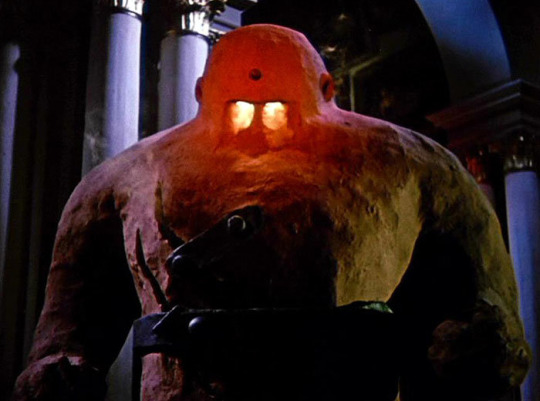
But I looked at wiki for less fairytale-y informations and:
The most famous golem narrative involves Judah Loew ben Bezalel, the late 16th-century rabbi of Prague, also known as the Maharal, who reportedly "created a golem out of clay from the banks of the Vltava River and brought it to life through rituals and Hebrew incantations to defend the Prague ghetto from anti-Semitic attacks and pogroms".[16][17] Depending on the version of the legend, the Jews in Prague were to be either expelled or killed under the rule of Rudolf II, the Holy Roman Emperor.
They're not the same, I doubt LB wrote them as such, unless she was trying to say mythical Jewish protectors were evil, but there are similarities.
They're made by powerful leader of people oppressed over a long period of time, who happen to be in greater danger than usual. They're made by unconventional, for ordinary mortals forbidden, means.
The greatest difference is golem was made out of ordinary material, brought into life by said magic, while nichevo'ya are almost completely merzost-made out of the Darkling's own being. Horrifying way to protect others.
#reply#Grishaverse#Shadow and Bone#The Darkling#nichevo'ya#grishanalyticritical#myths#Jewish#golem#Grisha
10 notes
·
View notes
Text
jsem poslední Vánoce koukala na Císařův pekař a Pekařův císař poprvé od útlého dětství a

Somebody: This is communistic propaganda.
Czechs: Yes.
Somebody: Like... a lot of propaganda.
Czechs: Yes.
Somebody: It is targeted at children.
Czechs: Yes.
Somebody: Shouldn't you stop watching it?
Czechs: No.
#čočkou třicetileté osoby s povědomím o historii to byl......úsměvnej prožitek řekněme#:-)#pohádky#některý koncepty jsou tam jakoby hůř uvěřitelný než kouzla#still kinda liked it tho!!!!#czech stuff
747 notes
·
View notes
Text

Brečim
@adsumcirrat servíruje dnešní čaj
#pohádky#hezky česky#obrození#český tumblr#obrozujeme#čumblr#císařův pekař#pekařův císař#krkonošské pohádky#jess talks
482 notes
·
View notes
Photo

Císařův pekař / The Emperor's Baker - The Baker's Emperor (1951) dir. by Martin Frič.
#Císařův pekař#Císařův pekař - Pekařův císař#The Emperor's Baker - The Baker's Emperor#The Emperor and the Golem#Martin Frič#Czechoslovak#Czech#Czechoslovak Cinema#Czech Cinema#Comedy#History#Cats#My Screenshots#GD#hele koťe ♥
357 notes
·
View notes
Photo

Rudolf II
0 notes
Text
Spíš asi ne, ale pekař Matěj je určitě komunistická ikona.
(Prej jsou ty písničky v tom filmu komunistická propaganda a tak je v cizojazyčných vydáních odstranili. SMH).
chábři když už sme to obrození
navrhuji začít agresivně normalizovat jednotné použití oni jako ukazovací zájmeno pro nebinární lid.(podobně jako anglické they) a společně s tím takový to uuhh genderování sloves.
nebo popřípadě vymyslet nějakou slušnou alternativu, páč "já jsem mysleli" mi zní tak pofidérně (ale hele nevim, já nejsem jazykovědec)
(pokavaď už někdo vymyslel tak mě to nějak minulo a omlouvám se)
poďme se legitimně zapsat do historie, byla by to strašná sranda. xd
73 notes
·
View notes
Text
Naprosto brutální hodnocení králů z pohádek
Už dlouho jsem žádné hodnocení nenapsala, takže nastal čas. Králů je v českých pohádkách hrozně moc, takže se omezuju na ty z filmových pohádek a na ty, které si aspoň trochu pamatuju. Let’s gooooo, king(s).
Král Miroslav (Pyšná princezna, 1952)

Podivuhodný exemplář postavy s přístupem „I can change her“ oblečený v punčocháčích a středověkých šortečkách, vyznávající tvrdý, ale šťastný komunismus. Nevěřím mu. 3/10
Král Ctirad (Nesmrtelná teta, 1993)

Tragická figura a opravdu schopný vladař? I mean, sure. 4/10
Král Hostivít (Princezna se zlatou hvězdou, 1959)

Klasický klaďas, hodný taťka a slabý vladař. Fandím jeho vousům a barevnému sladění s Ladou. 5/10
Král Dobromysl (Šíleně smutná princezna, 1968)

Vládce Veselého království, zjevně fanda moderního interiérového designu založil existenci celé své země na smíchu. Snaha dobrá, král slabší. 5/10
Král Kazisvět (Princezna se zlatou hvězdou, 1959)

Kazisvět šestý, z Boží vůle král, mocný panovník a hlava pomazaná. Módní ikona, nemám co dodat. 6/10
Král Jindřich (Šíleně smutná princezna, 1968)

Další fashionista na seznamu (tygří vzor? hello?), automaticky má trochu navrch, protože ho hraje Marvan. 6,5/10
Král Pikola (Tři veteráni, 1984)

Otec jedné z největších propagátorek body negativity české scény, efektivní zloděj a podvodník. Originalita se mu prostě musí nechat. 7/10
Král, otec Zlatovlásky (Zlatovláska, 1973)

Při intrikování seděl, aby Brumbál mohl při intrikování běhat. Pravděpodobně sexuálně zdatný (mně je to jedno, ale někoho by to mohlo zajímat!). 7,5/10
Král (Zlatovláska, 1973)

Dlouholetí čtenáři mého blogu vědí, že mám pro něj slabost, protože si svůj temný osud nezasloužil. A taky protože je asi nejblíž Disney zloduchovi, co u nás máme (jakože má záporácké monology prokládané záporáckou písní). 8,5/10
Rudolf II. (Pekařův císař, Císařův pekař; 1952)

Nepřítel zvířat („Tak ho bodni do němé tváře!“), milovník umění a tajemna, hlavní postava a hrozný idiot. *chef’s kiss* 9/10 (císař, ale královské tituly měl taky)
Král Já I. (Byl jednou jeden král, 1954)

Druhý Werichův výkon na tomto seznamu, jemuž není co vytknout (až na úplně všechno). Bonus za to, že demonstruje klady i zápory chození do přírody (klad: můžu se tam setkat s perspektivní milfkou; zápor: může mě sežrat bažina). 10/10
Tento post jsem měla doslova týdny v draftech, protože se mi nezdál. Ale nastal čas! Kritiku nepřijímám, můžete mi ale posílat další krále na zhodnocení :).
#pohádky#český blog#český tumblr#nevím co dělám se svým životem#ale tohle mě těší#ó bože snad nevyvolám kontroverzi!
184 notes
·
View notes
Text
tumblr viděl 100 filmů! aneb 25. statistika

Princezna se zlatou hvězdou (1959) : vidělo 97,6 %, nezná 0 %
Tři oříšky pro Popelku (1973) : vidělo 95,9 %, nezná 0 %
Pyšná princezna (1952) : vidělo 94,3 %, nezná 0 %
S čerty nejsou žerty (1985) : vidělo 93,9 %, nezná 1,2 %
Noc na Karlštejně (1974) : vidělo 92 %, nezná 1,3 %
Lotrando a Zubejda (1997) : vidělo 91,5 %, nezná 1,2 %
Princ a Večernice (1979) : vidělo 91,3 %, nezná 1,4 %
Ať žijí duchové (1977) : vidělo 90,8 %, nezná 5,3 %
Princezna ze mlejna (1994) : vidělo 90,7 %, nezná 1,3 % N
Anděl Páně (2005) : vidělo 88,4 %, nezná 1,1 %
náhodné poznatky: speciální faktoidní edice
zastoupení filmů podle dekády je takovéhle:
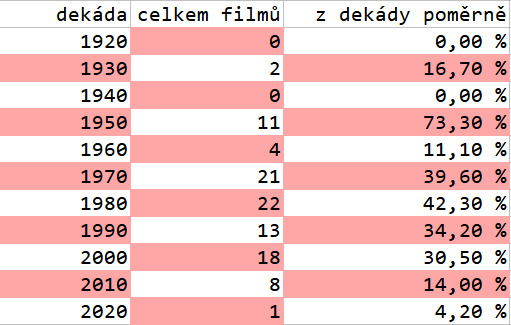
Nejvíce známých filmů pochází z osmdesátých let, pak následují sedmdesátky a za nimi s drobným odstupem roky 2000–2009; stále existují dvě dekády, z kterých nikdo nic neviděl, a uboze jsou na tom nové filmy, které obvykle znáte, ale nesledujete je (ten jediný spatřený film je štědrovečerní pohádka); zdaleka nejpopulárnější dekáda jsou ovšem léta padesátá, kde jde sice jen o 11 filmů, to ale představuje hned 73 % ze všech filmů z této dekády, o kterých se hlasovalo – asi budu muset dát do pranice něco budovatelského, aby se to vyrovnalo
nejúspěšnějšími roky z pohledu kultovnosti jejich filmů jsou 1977 a 1980 (po pěti filmech), jinak je to poměrně vyrovnané
jediná dekáda, kde jsme kolektivně viděli aspoň jeden film z každého roku, jsou nulté roky, jinak se to žádnému desetiletí nepovedlo, ale osmdesátky se blíží (schází už jen 1988!)
průměrný počet hlasů je (zaokrouhleně) 76, což je více než u všech filmů dohromady (70) i u neznámých filmů (64)
stejně jako u stovky neznámých filmů jsem si dovolila něco o žánru:
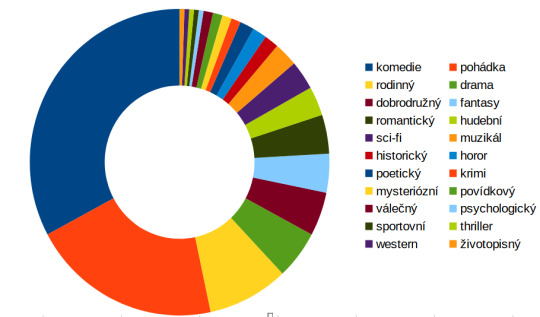
Celkem nepřekvapivě jsou top 3 žánry komedie (64), pohádka (40) a rodinný film (17) – pro srovnání u 100 neznámých filmů šlo o komedii (57), drama (39) a pohádku (9) – jsme prostě veselý národ; stejně jako minule předestírám, že jde o žánry z ČSFD, někdy značně pochybné.
a závěrem statistika dle režisérů (hvězdičkou jsou označeni ti, kteří figurují také v žebříčku neznámých filmů, kurzívou pak ženy):
10 filmů: Zdeněk Troška*
8 filmů: Václav Vorlíček*
7 filmů: Oldřich Lipský*
5 filmů: Martin Frič*, Karel Janák*
4 filmy: Bořivoj Zeman*, Jiří Menzel*, Jan Svěrák
3 filmy: Marie Poledňáková, Ladislav Smoljak*
2 filmy: Karel Zeman, Zdeněk Podskalský*, Karel Smyczek, Jiří Strach*, Vlasta Janečková, Jan Hřebejk, F. A. Brabec*, Věra Plívová-Šimková*, Dušan Klein*, Karel Steklý, Juraj Herz*, Václav Gajer
1 film: Hynek Bočan, Jiří Adamec, Jiří Vejdělek, Eduard Hofman, Filip Renč*, Josef Mach, Ivo Macharáček, Vladimír Karlík, Antonín Moskalyk, Vlasta Pospíšilová + Aurel Klimt*, Roman Vávra, Ludvík Ráža, Zdeněk Zelenka, Jiří Věrčák, Peter Bebjak, Miloslav Šmídmajer*, Ondřej Trojan*, Antonín Kachlík, Zdeněk Sirový*, Milan Cieslar*, Petr Nikolaev*, Ivo Novák*, Jindřich Polák*
ve srovnání s režiséry neznámých filmů je tu patrný jistý monopol a musím vám říct, že ten Troška na mě skočil totálně nečekán a ze zálohy
Tož. Stačilo by. Uvidíme se opět, až uvidíte nebo neuvidíte nějaké filmy. Celý žebříček viděných filmů najdete pod perexem. Mějte se fanfárově.
Princezna se zlatou hvězdou (1959)
Tři oříšky pro Popelku (1973)
Pyšná princezna (1952)
S čerty nejsou žerty (1985)
Noc na Karlštejně (1974)
Lotrando a Zubejda (1997)
Princ a Večernice (1979)
Ať žijí duchové (1977)
Princezna ze mlejna (1994) N
Anděl Páně (2005)
S tebou mě baví svět (1982)
Jak utopit dr. Mráčka aneb Konec vodníků v Čechách (1974)
Tři veteráni (1983)
Šíleně smutná princezna (1968)
Marečku, podejte mi pero! (1976)
Anděl Páně 2 (2016)
Jak dostat tatínka do polepšovny (1978)
Jak vytrhnout velrybě stoličku (1977)
Princezna ze mlejna 2 (2000) N
Princové jsou na draka (1980)
Zlatovláska (1973)
Císařův pekař - Pekařův císař (1951)
Pelíšky (1999)
Adéla ještě nevečeřela (1978)
Jak se budí princezny (1977)
Honza málem králem (1977)
Dívka na koštěti (1971)
Limonádový Joe aneb Koňská opera (1964)
Účastníci zájezdu (2006)
Stvoření světa (1957)
O princezně Jasněnce a létajícím ševci (1987) N
Jára Cimrman ležící, spící (1983)
Na samotě u lesa (1976)
Rebelové (2001)
Vesničko má středisková (1985)
Z pekla štěstí (1999)
Vrchní, prchni (1980)
Hrátky s čertem (1957)
Tajemství staré bambitky (2011)
Slunce, seno, jahody (1984)
Slunce, seno a pár facek (1989)
Sněženky a machři (1982) N
Kytice (2000)
O princezně, která ráčkovala (1986)
Obecná škola (1991)
Cesta do pravěku (1955)
Třetí princ (1982)
Slunce, seno, erotika (1991)
Postřižiny (1980)
Nejkrásnější hádanka (2008)
Kameňák (2003)
Páni kluci (1975)
Fimfárum Jana Wericha (2002)
Dařbuján a Pandrhola (1959)
Popelka (1969)
Kolja (1996)
Kuky se vrací (2010)
Snowboarďáci (2004)
Jezerní královna (1998) N
Čert ví proč (2003)
Tajemství hradu v Karpatech (1981)
Jak básníci přicházejí o iluze (1984)
Sedmero krkavců (1993)
Dobrý voják Švejk (1956)
Což takhle dát si špenát (1977)
Korunní princ (2015) N
Rafťáci (2006)
Kouzla králů (2008)
Škola základ života (1938)
Krakonoš a lyžníci (1980)
Saturnin (1994)
Poslušně hlásím (1957)
Slavnosti sněženek (1983)
Krakonošovo tajemství (2022)
Vratné lahve (2007)
Jak svět přichází o básníky (1982)
Probudím se včera (2012)
Jáchyme, hoď ho do stroje! (1974)
Spalovač mrtvol (1968)
Občanský průkaz (2010)
Princ Bajaja (1974)
Černí baroni (1992)
Dešťová víla (2010)
Princezna a půl království (2019) N
Pupendo (2003)
Panna a netvor (1978)
Báječná léta pod psa (1997)
Léto s kovbojem (1983)
Z pekla štěstí 2 (2001) N
Rozpuštěný a vypuštěný (1984)
Trhák (1980)
Pod Jezevčí skálou (1978) N
Anděl na horách (1955)
Ať žijí rytíři (2009)
Kačenka a strašidla (1992)
Máj (2008)
Vynález zkázy (1958)
Král sokolů (2000)
Na pytlácké stezce (1979) N
Kristián (1939)
9 notes
·
View notes
Note
(weird asks) 1,8,22,30,55,91
1. coffee mugs, teacups, wine glasses, water bottles, or soda cans?
Wine glasses, there is just something so elegant about them.
8. movies or tv shows?
Movies, because it takes a lot more effort, time and dedication to watch tv shows than movies.
22. role model?
I don’t think I have a role model really? I dunno, I think I never had one.
30. places that you find sacred?
Oh, this one is really fun! Definitely every place that holds some religious value for anyone, then woods and nature as such. Also old, abandoned buildings. I freaking love those. The smells, the atmosphere. Beautiful.
55. favorite fairy tale?
Oh, you won’t know this one, but I really adore this old czechoslovak one. It’s called Císařův pekař - Pekařův císař ( The Emperor's Baker - The Baker's Emperor). It’s basically about a humble baker which get’s mistaken for the spoiled emperor Rudolf.
91. boxes or bags?
Bags. Definitely bags. Especially linen ones. I’m a sucker for those.
Thank you so much for the ask hon, hope you’re having a beautiful day <3
@xena-styles
1 note
·
View note
Text
Day 211: V+W+J / Osvobozené divadlo

Today is the 28th October, which means it’s a bank holiday: The Days of the Establishment of the Czechoslovak Republic. The state I was born into and which seized to exist 27 years ago celebrates its birthday today. And although it may seem illogical to celebrate the biggest national holiday on the anniversary of the creation of the predecessor of our current state, it seems absolutely right to do so. Countries usually celebrate these holidays on the anniversaries of their independence. But if the successor state came into being as a result of a another part of the joint territory separating from their joint state and declaring independence, we can hardly expect the remaining state of the previous state, which sees itself as the core and continuation of the previous state, to celebrate its existence, national identity and tradition on the anniversary of the they when that state fell apart and seized to exist.
Although Austria used to celebrate the "Nationalfeiertag" on 12th November during the First Austrian Republic (1919-1933), and this date is connected to the downfall of the Austrian Empire, the date is first and foremost linked to the anniversary of proclamation of the First Austrian Republic and the end of monarchy, rather than the disintegration of the Hapsburg Empire itself. Belgians celebrate their National Day on the 26th September, which is the anniversary of the investiture of King Leopold I to the throne. It meant the end of a year long revolution and secession from the United Netherlands. Logically, the Dutch don’t celebrate their national day on any of the dates connected to this event, but rather on the birthday of their king (or queen). So it’s really no wonder, that Czechs follow this pattern as well. It’s not that exceptional after all.
This holiday is currently being hijacked by the incumbent president for the manifestation of his own selfish twisted political agenda, rather then being an inclusive celebration of country’s national and historical heritage and it’s people, but I am determined to hold on to the positive, inclusive and festive tone of this holiday and remembering it through music from the era of the 1st Czechoslovak Republic is one of the ways to do that.
youtube
From the Czech avant-garde circles of the mid 1920s emerged Jiří Voskovec (1905 - 1981) and Jan Werich (1905 - 1980), a fascinating duo of theater actors / playwrights / comedians / directors / writers. In 1926 influenced by dadaism and futurism they co-founded a small alternative theater in Prague and named it Osvobozené divadlo (Liberated Theater) - LIberated meaning liberated from traditional genres and forms of theater. They were quote vocal about social and political topics of the era, leftist oriented yet critical of the rising communists as well as the fascist movement. In several of their plays they mocked Hitler, Mussolini and Franco. They performed performed plays by modern authors such as Apollinaire, Jarry, Cocteau, Breton and Marinetti as well as their own original plays and revues.
The original music for their plays was supplied by Jaroslav Ježek (1906 - 1942), a brilliant jazz / swing pianist and composer. He also wrote classical and film music, but jazz and swing were his field of specialty. Together they became known under the abbreviation V+W+J. Since they were so openly critical about the the rising Nazism in neighbouring Germany and popular among the general public, in the autumn of 1938 when Germany annexed the border regions of Czechoslovakia, it became clear that they would be among the first group to be targeted and arrested should Germany occupy the rest of Czechoslovakia. They fled the country in January 1939, just few weeks before the Germans troops rolled in. They spent the war years mostly in New York City. Jaroslav Ježek, who had suffered from ill health since his childhood, died in America on New Year’s Day 1942 at the age of 35. Voskovec and Werich returned back to Prague after the war and reopened their theater. But soon after that, after the communist coup in 1948, Voskovec emigrated again and returned to USA. Jan Werich remained in Czechoslovakia. You can read up on them on Wikipedia. Today, I would like to introduce you to the music Jaroslav Ježek and his collaborators.


In Bůh suď (Let the God Judge) and Usměrněná píseň (Regulated Song) they make pure political satire. They are no longer hinting on political situation in Germany and Italy, they openly name Mussolini and mock Hitler by nicknaming him Adolf Kohos. They make fun of their geopolitical aggression and practices in politics. Even these two songs would have been enough to get them arrested firsth thing after the occupation. Pochod stoprocentních mužů (The March of Hundred Percent Men) is a song from the play / revue Golem, which premiered in the Osvobozené divadlo in 1931. It tells the story of Golem, a clay figurine of superhuman proportions and equipped with superhuman strength created by the Jewish rabbi Löw, who controlled him with the scheme Ha M´Fóráš (represented by artificial teeth in this play), and intrigues at the imperial court where many wanted to control the Golem. The play was very successful and in 1951 the story was turned into a double film Císařův pekař (The Emperor's Baker) / Pekařův císař (The Baker's Emperor) directed by Martin Frič. Noisy Serenade and Full Moon’s Music are original compositions by Jiří Traxler written directly for Ježek’s Jazz Orchestra. Similarly Biguine Hydroplane (Biguine v hydroplánu) was composed by Jiří Srnka for this orchestra and it featured in the Robin zbojník revue (Robin the Robber) and in the film Peníze nebo život (Money or life), a second film by V+W, directed in 1932 by Jindřich Honzl.
My selection closes with Bugatti Step, Ježek’s most famous composition to date. And it’s so famous it’s still being used in films and adverts as well. I am almost embarrassed to put it on the list how famous it is. But just in case someone who has never heard it is reading this, I will list list it nevertheless.

Happy Wednesday, relax and enjoy.
Highlights: - Noisy Serenade - Full Moon’s Music - Biguine Hydroplane - Bůh suď (Let the God Judge) - Usměrněná píseň (Regulated Song) - Pochod stoprocentních mužů (The March of Hundred Percent Men) - Bugatti Step
Playlist: shorturl.at/fEUX4 Links and references: - Osvobozené divadlo (Liberated Theatre) - Wikipedia - Jaroslav Ježek - Wikipedia
1 note
·
View note
Photo
When I was doing Stone Prisoner for the first time and got the control rod to wake up Shale I thought it will be like in movies Pekařův císař a Císařův Pekař 😂 Just put the shem in to the hole situated on his forehead. I forgot it was a rod and not a sphere. 😂

CONFESSION:
So in one of the versions of the story of the Golem of Prague, after killing the cossacks who’d invaded the Jewish Quarter, the golem turned on the jews and Rabbi Loeb. Rabbi Loeb froze it forever and it’s supposedly still in the attic of the Old New Synagogue to this day. When I first got Stone Prisoner, and met Shale, I heard ‘golem who turned against their master and froze as a statue’ and lost my shit. Obviously Wilhelm is nothing like Rabbi Loeb, but I still think there’s a strong parallel.
84 notes
·
View notes